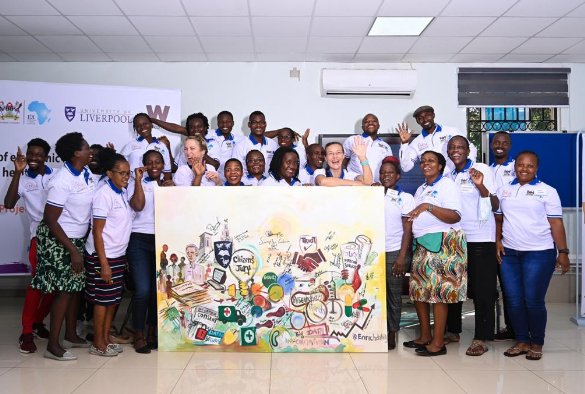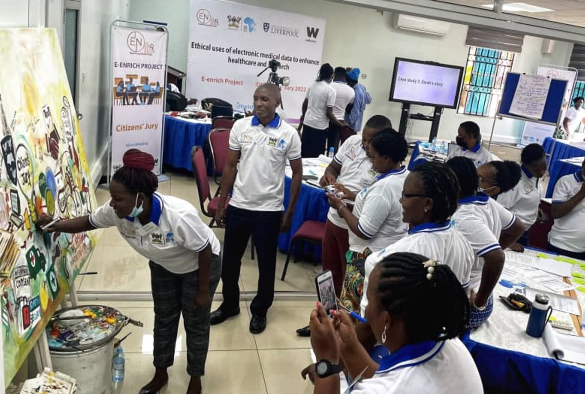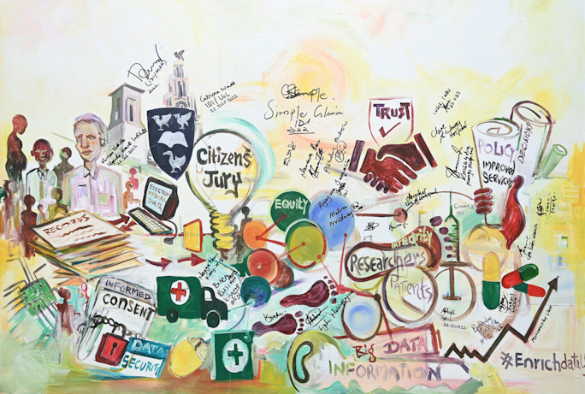
Dr Lauren Walker from the University’s Department of Pharmacology & Therapeutics travelled to the Infectious Diseases Institute (IDI) at Makerere University in Kampala, Uganda to work on the E-enrich project alongside colleague Professor Catriona Waitt, who has been based at IDI since 2015.
Whilst the UK has well established electronic medical records and systems by which data may be accessed by researchers, many lower income countries such as Uganda are in an earlier phase of adoption of electronic medical records. Therefore the University of Liverpool’s Knowledge Exchange funding provided the perfect opportunity to strengthen our partnership and obtain preliminary data from Uganda.
On 21 and 22 July we hosted what we believe may have been the first healthcare-related citizens jury in Uganda, which aimed to garner attitudes towards the use of electronic medical data in the research context. A citizens’ jury is an approach ideal for new or complex areas, and enables a ‘social license statement’ to be drafted to guide policy and practice. This approach has been used on the same topic in the UK, and we drew from their example, with adaptations made to map to local context.
Applications for jurors were sought from hospitals and clinics around Kampala over a two month period and 15 were selected as representatives. Over two days, four experts provided evidence on how data are collected and used, the importance of data protection and management and on bioethical considerations and challenges. Alongside the expert testimony, we hosted interactive sessions involving both data science and ethical scenarios to ascertain the ethical themes that arose surrounding these sensitive topics. These helped to shape the overall license, blending across a triad of faith, culture and human rights. Appropriate time for discussion and debate was provided, together with the use of art, photography, film, drama and dance to capture ideas and themes.
The final verdict was that jurors were unanimous that with appropriate consent, electronic medical data could be used in a research context provided the individual or group seeking to use the data had a very clear proposal and aims together with a data protection and management plan that could be approved by a gatekeeping committee. In contrast to other settings, they felt that no type of medical data (for example relating to HIV status or sexual health) should be privileged, as a complete dataset is necessary to draw the most accurate conclusions from research.
The event was supported by the Executive Director and Senior Management Team at IDI, where there is a desire to adopt this approach to other emerging and complex areas in healthcare research. We are delighted by how successful our first citizens’ jury has been. All team members and jurors described how their understanding of the topic had increased significantly, rated the jury highly, and are keen to participate in future events, of which we hope there are many!
Alongside specific clinical pharmacology research questions, our portfolio aims to increase equity of access to research and provide ethical frameworks for novel and adaptive study designs. Examples include fair inclusion rather than systematic exclusion of pregnant and breastfeeding women in clinical trials; clinical trials in outbreak settings or during acute severe illness; and adaptive study design – with such complex considerations of risk and benefit, the citizens jury provides a strong framework to understand and simultaneously respond to community perceptions. We intend to further showcase this event as an exemplar of how citizens jury methodology can be adapted to culturally diverse and lower-resource settings.

